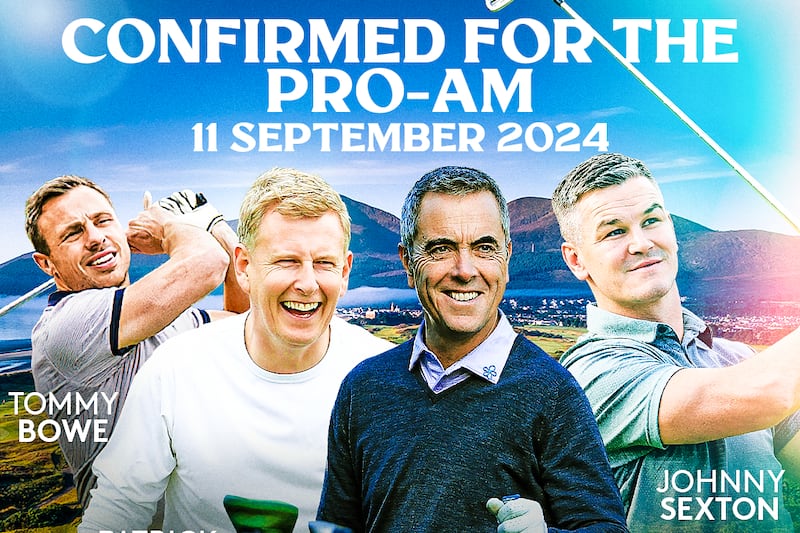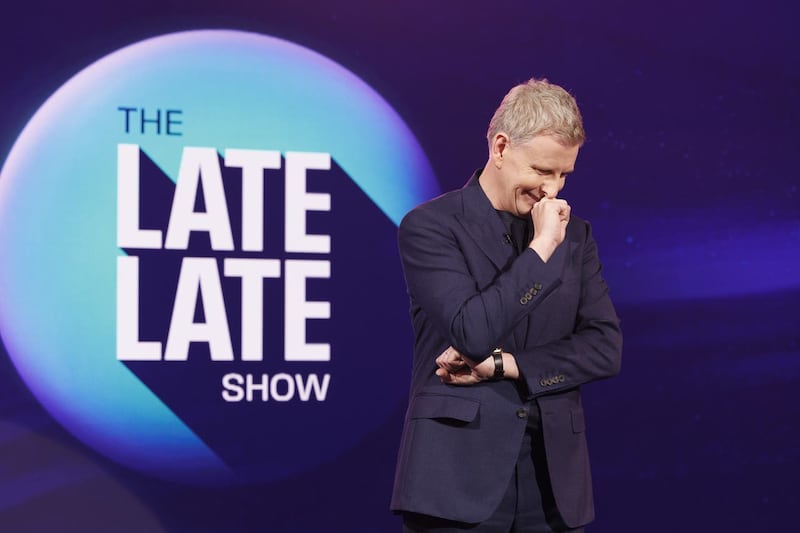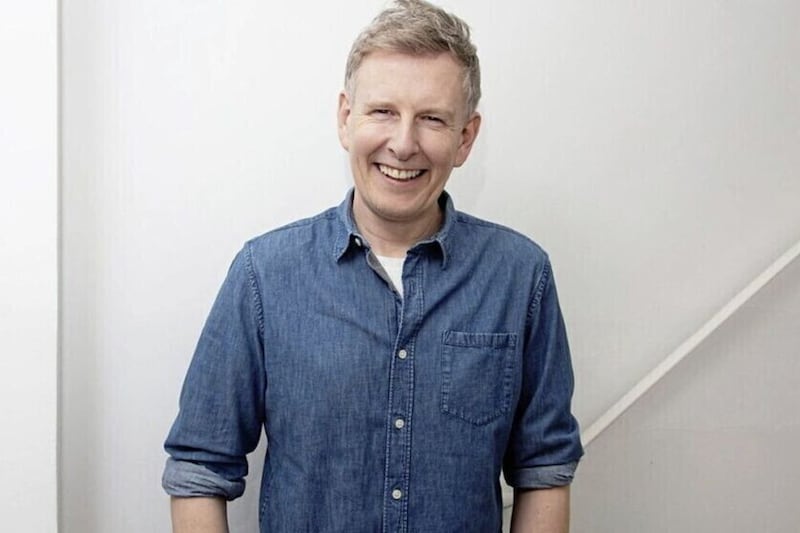"I ALWAYS think, with stand-up, there's no point in getting up there unless you've actually got something to say," explains Paddy Kielty, who is making his long-awaited return to live comedy right now with his politically-charged show Borderline.
Currently taking him around Ireland and then 'across the water', it's the Co Down comic's first stand-up tour for seven years and a show very much rooted in the north's troubled history and our increasingly rocky relationship with Britain – the latter having (d)evolved considerably since he was last at the mic on a regular basis.
Borderline is described as "a comedic love letter to the future of our islands from his personal past". As they say in the political realm, this is a 'significant development' for Dundrum-born Kielty (51), whose last stand-up tour in 2015, Help, found him consciously moving away from the kind of politically-charged material he cut his teeth with as a rising star on our local comedy circuit during the 1990s.
Indeed, the comic's previous tour, 2012's pointedly titled Home, was supposed to have been "a clearing of the decks for the angry young man", then aged 41 and just about to marry TV presenter Cat Deeley, with whom he now has two children.
Fittingly, the new show arrives in the 30th anniversary year of Kielty's very first live comedy performances at The Empire in Belfast.
"If somebody had said to me [then] that I would be doing a show for the whole of the UK and Ireland which featured Northern Ireland politics, I would have told them they were talking out of their a***," he admits.
"But the thing that's really driven this show and really changed things for me is that politics in these islands has changed because of Brexit. Northern Ireland is now very much at the epicentre of what's going on in a wider political arena.
"I think the lessons we have learned here, how we look at borders and live alongside people who are 'different' to us and how that makes these islands work – or, sometimes, not work – are actually pretty pertinent to a wider audience right now."
He adds: "I think that when circumstances change, if I as a stand-up am not going to get up there and try to make sense of what's going on, well then I'm not doing my job.
The comedian also tackled pressing local issues in his acclaimed BBC documentaries Patrick Kielty: One Hundred Years of Union (2021) and My Dad, The Peace Deal and Me (2018), which found him delving into how Brexit has re-politicised the border and potentially undermined the Good Friday Agreement.
Kielty's own Troubles-related family trauma was at the centre of both films: his father was murdered by the UDA-affiliated UFF in 1988 – an intensely personal matter the comedian was reluctant to talk about openly until fairly recently.
"I was always very concious that everybody in Northern Ireland knows someone who has lost someone or has gone through that themselves," he admits.
"You always had that thing in your head of not wanting people to be thinking, 'Jesus, here's your man rambling on about that again, give it a rest – we've all been through it'.
"But actually, I've discovered that by me talking about what I've been through, it's encouraged so many other people to come forward and want to talk about what they've been through as well."
Last December, Kielty was invited to address the Irish Government's Shared Island initiative: his emotive speech, in which he spoke about the continued need for dialogue between opposing viewpoints, quickly went viral on Twitter in much the same way as 2018's 20-point take-down of why Boris Johnson's Brexit bluster could spell disaster for peace in Northern Ireland.
"For a long time I had quite a simplistic view, which was we've got to draw a line [under the Troubles] and move on for the sake of the new generation," comments Kielty of how his position on how to deal with the legacy of the Troubles has shifted.
"But what I've learned more recently is that, the more you talk about stuff like what we have in common and our differences, then the less fearful people are."
After 14 years of dividing their time between Los Angeles, London and Dundrum, in early 2020 Kielty and family gave up their Californian home to be permanently based on this side of the Atlantic – just in time for Covid to throw their plans into chaos.
"We'd come home because we wanted to get the kids into schools over here and we wanted them to see their extended family – then we spent the next 18 months seeing nobody and teaching them ourselves," chuckles the comic, who will make his big screen debut this year alongside Seána Kerslake in Prasanna Puwanarajah's drama Ballywalter, written by Belfast film-maker Stacey Gregg (Here Before).
"What is it they say – 'The secret of comedy is timing'?"

However, at least the move has meant Kielty has has been well placed to observe rising political temperatures and increased social unrest both in England and in the north over the past couple of years, all of which has filtered into Borderline.
Indeed, given Russia's ongoing invasion of Ukraine, locally familiar issues like nationality, identity and borders could not feel more globally topical.
"You can do as many documentaries and speeches as you want but sometimes there's stuff that you can really only say when you're onstage," he tells me of why he's been dying to get back to doing stand-up.
"One of the big things for me writing this show was that for a long time other people didn't really want to hear what was going on in Northern Ireland. And, for a long time, we were made to feel like we were bats**t crazy and that our job was to try and normalise ourselves to be more like other people.
"But the more you travel and the more you see, you realise that we weren't bats**t crazy at all – and, despite all the lessons that we learned [during the Troubles and peace process], there's now other people who are making bats**t crazy decisions about us.
"What we came through here and how we've come out the other end of it – by giving a little ground, loosening up – was sort of the opposite of 'taking back control'. So it was then fascinating to be back living in London with all this 'take back control' stuff being seen as a positive thing.
"I think we are now at the centre of something which is bigger – the thin end of the wedge when it comes to nationalism and all of those things is Brexit. And then you see what is happening in the rest of Europe and how it can go way further.
"That's kind of why I feel that audiences further afield might actually want to hear someone from here giving their take on this stuff right now."
He adds: "The best comedy has truth in it and the art of stand-up is really getting up there and trying to make sense – and make funny – of the truth. And we now live in a world where you don't just have 'the truth' any more, you have half-a-dozen 'versions' of the truth."
Sounds like he has his work cut out for him.
:: Patrick Kielty – Borderline: Millennium Forum, Derry (tonight/March 6), Portico, Portaferry (March 5), Theatre at The Mill, Newtownabbey (March 10), An Grianan, Letterkenny (March 11), Strule Arts Centre, Omagh (March 12), Market Place Theatre, Armagh (March 13) and the Lyric, Belfast (March 15-20). Tickets and full tour dates at patrickkielty.com/ireland-dates







